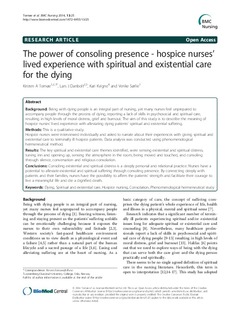The power of consoling presence - hospice nurses ’ lived experience with spiritual and existential care for the dying
Journal article, Peer reviewed
Permanent lenke
http://hdl.handle.net/11250/226150Utgivelsesdato
2014-09-03Metadata
Vis full innførselSamlinger
Originalversjon
Tornøe, K., Danbolt, L.J., Kvigne, K. & Sørlie, V. (2014). The power of consoling presence - hospice nurses' lived experience with spiritual and existential care for the dying. BMC Nursing, 13:25. doi: http://dx.doi.org/10.1186/1472-6955-13-25 http://dx.doi.org/10.1186/1472-6955-13-25Sammendrag
Background: Being with dying people is an integral part of nursing, yet many nurses feel unprepared to accompany people through the process of dying, reporting a lack of skills in psychosocial and spiritual care, resulting in high levels of moral distress, grief and burnout. The aim of this study is to describe the meaning of hospice nurses’ lived experience with alleviating dying patients’ spiritual and existential suffering.
Methods: This is a qualitative study. Hospice nurses were interviewed individually and asked to narrate about their experiences with giving spiritual and existential care to terminally ill hospice patients. Data analysis was conducted using phenomenological
hermeneutical method.
Results: The key spiritual and existential care themes identified, were sensing existential and spiritual distress, tuning inn and opening up, sensing the atmosphere in the room, being moved and touched, and consoling through silence, conversation and religious consolation.
Conclusions: Consoling existential and spiritual distress is a deeply personal and relational practice. Nurses have a potential to alleviate existential and spiritual suffering through consoling presence. By connecting deeply with patients and their families, nurses have the possibility to affirm the patients’ strength and facilitate their courage to
live a meaningful life and die a dignified death.
Keywords: Dying, Spiritual and existential care, Hospice nursing, Consolation, Phenomenological hermeneutical study
Beskrivelse
This is an Open Access peer-reviewed scientific article originally published in the journal BMC Nursing. You can access the article by following this link: http://www.biomedcentral.com/bmcnurs/. The article is published under the Creative Commons Attribution License 4.0. Please consult BioMed Central's license agreement:
http://www.biomedcentral.com/authors/license.
